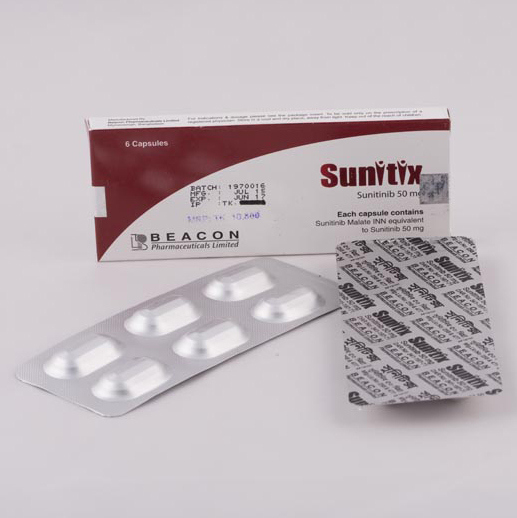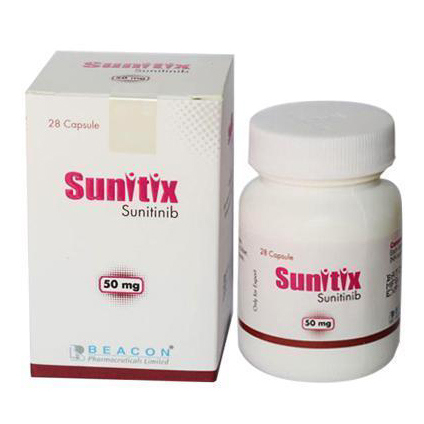Unit Price:
৳ 1,045.00
(1 x 6: ৳ 6,270.00)
Strip Price:
৳ 6,270.00
Unit Price:
৳ 1,045.00
(5 x 6: ৳ 31,350.00)
Strip Price:
৳ 6,270.00
Also available as:
Indications
Sunitix capsule is indicated in-
Gastrointestinal Stromal Tumor (GIST): It is indicated for the treatment of gastrointestinal stromal tumor after disease progression on or intolerance to Imatinib Mesylate.
Advanced Renal Cell Carcinoma (RCC): It is indicated for the treatment of advanced renal cell carcinoma.
Adjuvant Treatment of Renal Cell Carcinoma (RCC): It is indicated for the adjuvant treatment of adult patients at high risk of recurrent RCC following nephrectomy.
Advanced Pancreatic Neuroendocrine Tumors (pNET): It is indicated for the treatment of progressive, well-differentiated pancreatic neuroendocrine tumors in patients with unresectable locally advanced or metastatic disease.
Gastrointestinal Stromal Tumor (GIST): It is indicated for the treatment of gastrointestinal stromal tumor after disease progression on or intolerance to Imatinib Mesylate.
Advanced Renal Cell Carcinoma (RCC): It is indicated for the treatment of advanced renal cell carcinoma.
Adjuvant Treatment of Renal Cell Carcinoma (RCC): It is indicated for the adjuvant treatment of adult patients at high risk of recurrent RCC following nephrectomy.
Advanced Pancreatic Neuroendocrine Tumors (pNET): It is indicated for the treatment of progressive, well-differentiated pancreatic neuroendocrine tumors in patients with unresectable locally advanced or metastatic disease.
* রেজিস্টার্ড চিকিৎসকের পরামর্শ মোতাবেক ঔষধ সেবন করুন
Pharmacology
Sunitinib is a small molecule that inhibits multiple receptor tyrosine kinases (RTKs), some of which are implicated in tumor growth, pathologic angiogenesis, and metastatic progression of cancer. Sunitinib was evaluated for its inhibitory activity against a variety of kinases (>80 kinases) and was identified as an inhibitor of platelet-derived growth factor receptors (PDGFRα and PDGFRβ), vascular endothelial growth factor receptors (VEGFR1, VEGFR2, and VEGFR3), stem cell factor receptor (KIT), Fms-like tyrosine kinase-3 (FLT3), colony stimulating factor receptor Type 1 (CSF-1R), and the glial cell-line derived neurotrophic factor receptor (RET). Sunitinib inhibition of the activity of these RTKs has been demonstrated in biochemical and cellular assays, and inhibition of function has been demonstrated in cell proliferation assays. The primary metabolite exhibits similar potency compared to sunitinib in biochemical and cellular assays.
Dosage & Administration
Recommended Dose for GIST and Advanced RCC: The recommended dose of Sutinib for gastrointestinal stromal tumor (GIST) and advanced renal cell carcinoma (RCC) is one 50 mg oral dose taken once daily, on a schedule of 4 weeks on treatment followed by 2 weeks off (Schedule 4/2). It may be taken with or without food.
Recommended Dose for Adjuvant Treatment of RCC: The recommended dose of Sutinib for the adjuvant treatment of RCC is 50 mg taken orally once daily, on a schedule of 4 weeks on treatment followed by 2 weeks off (Schedule 4/2), for nine 6-week cycles. It may be taken with or without food.
Recommended Dose for pNET: The recommended dose of Sutinib for pancreatic neuroendocrine tumors (pNET) is 37.5 mg taken orally once daily continuously without a scheduled off-treatment period. It may be taken with or without food.
Recommended Dose for Adjuvant Treatment of RCC: The recommended dose of Sutinib for the adjuvant treatment of RCC is 50 mg taken orally once daily, on a schedule of 4 weeks on treatment followed by 2 weeks off (Schedule 4/2), for nine 6-week cycles. It may be taken with or without food.
Recommended Dose for pNET: The recommended dose of Sutinib for pancreatic neuroendocrine tumors (pNET) is 37.5 mg taken orally once daily continuously without a scheduled off-treatment period. It may be taken with or without food.
* রেজিস্টার্ড চিকিৎসকের পরামর্শ মোতাবেক ঔষধ সেবন করুন
Interaction
Strong CYP3A4 inhibitors such as Ketoconazole may increase Sunitix plasma concentrations. Selection of an alternate concomitant medication with no or minimal enzyme inhibition potential is recommended. Concurrent administration of Sutinib with the strong CYP3A4 inhibitor, Ketoconazole, resulted in 49% and 51% increases in the combined (Sunitix + primary active metabolite) Cmax and AUC0-∞ values, respectively, after a single dose of Sutinib in healthy volunteers. Coadministration of Sutinib with strong inhibitors of the CYP3A4 family (e.g., Ketoconazole, Itraconazole, Clarithromycin, Atazanavir, Indinavir, Nefazodone, Nelfinavir, Ritonavir, Saquinavir, Telithromycin, Voriconazole) may increase Sunitix concentrations. Grapefruit may also increase plasma s of Sunitix. A dose reduction for Sutinib should be considered when it must be coadministered with strong CYP3A4 inhibitors. CYP3A4 Inducers: CYP3A4 inducers such as Rifampin may decrease Sunitix plasma concentrations. Selection of an alternate concomitant medication with no or minimal enzyme induction potential is recommended. Concurrent administration of Sutinib with the strong CYP3A4 inducer, Rifampin, resulted in a 23% and 46% reduction in the combined (Sunitix + primary active metabolite) Cmax and AUC0-∞ values, respectively, after a single dose of Sutinib in healthy volunteers. Coadministration of Sutinib with inducers of the CYP3A4 family (e.g., Dexamethasone, Phenytoin, Carbamazepine, Rifampin, Rifabutin, Rifapentin, Phenobarbital, St. John’s Wort) may decrease Sunitix concentrations. St. John’s Wort may decrease Sunitix plasma concentrations unpredictably. Patients receiving Sutinib should not take St. John’s Wort concomitantly. A dose increase for Sutinib should be considered when it must be coadministered with CYP3A4 inducers.
Contraindications
It is contraindicated in patients with known hypersensitivity to Sunitinib or any other components of this product.
Side Effects
The most common side effects are: Hepatotoxicity, Cardiovascular Events, QT Interval Prolongation and
Torsade de Pointes, Hypertension, Hemorrhagic Events, Tumor Lysis Syndrome (TLS), Thrombotic Microangiopathy, Proteinuria, Dermatologic Toxicities, Thyroid Dysfunction, Hypoglycemia, Osteonecrosis of the Jaw (ONJ), Wound Healing.
Torsade de Pointes, Hypertension, Hemorrhagic Events, Tumor Lysis Syndrome (TLS), Thrombotic Microangiopathy, Proteinuria, Dermatologic Toxicities, Thyroid Dysfunction, Hypoglycemia, Osteonecrosis of the Jaw (ONJ), Wound Healing.
Pregnancy & Lactation
It can cause fetal harm when administered to a pregnant woman. There are no available data in pregnant women to inform a drug-associated risk. If it is used during pregnancy, or if the patient becomes pregnant while taking this drug, the patient should be apprised of the potential hazard to the fetus. There is no information regarding the presence of Sunitinib and its metabolites in human milk. Because of the potential for serious adverse reactions in breastfed infants from Sutinib, a lactating woman should be advised not to breastfeed during treatment with Sutinib and for at least 4 weeks after the last dose.
Use in Special Populations
Pediatric Use: The pharmacokinetics of Sutinib have not been evaluated in pediatric patients.
Renal Insufficiency: Sunitix systemic exposure after a single dose of Sutinib was similar in patients with severe renal impairment (CLcr <30 mL/min) compared to patients with normal renal function (CLcr >80 mL/min). Although Sunitix was not eliminated through hemodialysis, the Sunitix systemic exposure was 47% lower in patients with ESRD on hemodialysis compared to patients with normal renal function.
Hepatic Insufficiency: Systemic exposures after a single dose of Sutinib were similar in patients with mild
exocrine (Child-Pugh Class A) or moderate (Child-Pugh Class B) hepatic impairment compared to patients with normal hepatic function.
Cardiac Electrophysiology: Sutinib can cause QT interval prolongation in a dose-dependent manner, which may lead to an increased risk for ventricular arrhythmias including Torsade de Pointes.
Renal Insufficiency: Sunitix systemic exposure after a single dose of Sutinib was similar in patients with severe renal impairment (CLcr <30 mL/min) compared to patients with normal renal function (CLcr >80 mL/min). Although Sunitix was not eliminated through hemodialysis, the Sunitix systemic exposure was 47% lower in patients with ESRD on hemodialysis compared to patients with normal renal function.
Hepatic Insufficiency: Systemic exposures after a single dose of Sutinib were similar in patients with mild
exocrine (Child-Pugh Class A) or moderate (Child-Pugh Class B) hepatic impairment compared to patients with normal hepatic function.
Cardiac Electrophysiology: Sutinib can cause QT interval prolongation in a dose-dependent manner, which may lead to an increased risk for ventricular arrhythmias including Torsade de Pointes.
Overdose Effects
Treatment of overdose with Sutinib should be consisted of general supportive measures. There is no specific antidote for overdosage with Sutinib. If indicated, elimination of unabsorbed drug should be achieved by emesis or gastric lavage. Cases of accidental overdose have been reported; these cases were associated with adverse reactions consistent with the known safety profile of Sutinib, or without adverse reactions. A case of intentional overdose involving the ingestion of 1500 mg of Sutinib in an attempted suicide was reported without adverse reaction. In nonclinical studies, mortality was observed following as few as 5 daily doses of 500 mg/kg (3000 mg/m2) in rats. At this dose, signs of toxicity included impaired muscle coordination, head shakes, hypoactivity, ocular discharge, piloerection, and gastrointestinal distress. Mortality and similar signs of toxicity were observed at lower doses when administered for longer durations.
Therapeutic Class
Targeted Cancer Therapy
Storage Conditions
Store at 25°C in a cool and dry place, away from light. Keep out of the reach of children.
Pack Images: Sunitix 50 mg Capsule


